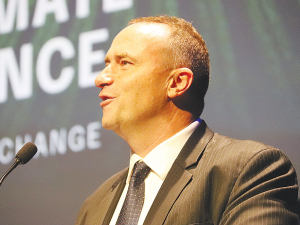MPI launches industry-wide project to manage feral deer
An industry-wide project led by Ministry for Primary Industries (MPI) is underway to deal with the rising number of feral pests, in particular, browsing pests such as deer and pigs.
 MPI's John Roche says consumers are recognising that the food system has a significant greenhouse gas footprint.
MPI's John Roche says consumers are recognising that the food system has a significant greenhouse gas footprint.
Some of the world's major food companies are demanding even more severe environmental targets than New Zealand has provision for in its own climate change legislation.
That's the view of Ministry for Primary Industries chief science advisor John Roche, who is also in charge of the ministry's recently set up On Farm Support organisation. Roche was one of the keynoe speakers at the recent Agricultural Climate Change conference held in Wellington.
He told the conference that consumers understand that the food system has a significant greenhouse gas footprint. Roche says somewhere between 20% and 30% of antigenic climate change is associated with food.
"So, the major food companies of the world have got the message from consumers to lower that and in turn are demanding that producers lower it as well."
Roche believes the charge for change is being led by the Europeans and they are pushing their farmers and growers to implement policies on farm to reduce their environmental footprint. He says such policies can have an economic impact on European farmers and they in turn are demanding that exporters, such as NZ, also comply with their standards.
Arguably this could be seen as a non-tariff trade barrier, but Roche claims if NZ wants to sell in certain overseas markets it has little choice but to comply with what amounts to local rules.
Roche noted at the conference that Agriculture Minister Damien O'Connor said that while NZ is a high quality and efficient producer of food, it is a small player in the global market and unless we comply with certain standards, people can source their food from other countries.
Roche says it's pretty clear that major global food companies are looking for carbon neutrality from the food system. He says agriculture accounts for 90% of the carbon footprint in food systems and that is inside the farm gate.
"We need to start there," he says.
On the positive side, Roche reckons he's never met a farmer anywhere in the world who doesn't want to do the right thing by climate change.
"Go to any farmers' conference and you will hear genuine conversations about their willingness to deal with climate change. It's a case of continuing the conversations and providing solutions and not just criticising, which is unhelpful."
Primary sector leaders have welcomed the announcement of a Free Trade Agreement between India and New Zealand.
|
A landmark moment for New Zealand. That's how Prime Minister Christopher Luxon describes the conclusion of negotiations for an India-New Zealand Free Trade Agreement. Beef Progeny Test 2025: Genetic insights for NZ beef industryAt Pāmu’s Kepler Farm in Manapouri, mating has wrapped up at the across-breed Beef Progeny Test. HortNZ celebrates 20 YearsMore than 150 people turned up at Parliament recently to celebrate the 20th anniversary of Horticulture New Zealand (HortNZ). Biosecurity NZ urges vigilance for yellow-legged hornetsBiosecurity New Zealand says Kiwis should continue to keep an eye out for yellow-legged hornets (Vespa velutina) over the holiday season. Mental Health and Fitness Unite: The Push-Up Challenge comes to New ZealandThe Push-Up Challenge, an event which combines mental health and fitness, is set to launch in New Zealand in 2026. NationalVelvetleaf: New Zealand’s most aggressive cropping weedVelvetleaf (Abutilon theophrasti) is an annual broad-leaved herb, originating in China, that can grow between 1 and 2.5 metres tall,…Farmers more satisfied with banks, but confidence remains below 2017 levelsAccording to the latest Federated Farmers banking survey, farmers are more satisfied with their bank and less under pressure, however,…Farmer confidence dips slightly, but positivity still dominatesFarmer confidence has taken a slight dip according to the final Rabobank rural confidence survey for the year.Nathan Guy is the new special agricultural trade envoyFormer Agriculture Minister and Otaki farmer Nathan Guy has been appointed New Zealand’s Special Agricultural Trade Envoy (SATE).Alliance commissions major heat pump system at Mataura, cutting coal use and emissionsAlliance Group has commissioned a new heat pump system at its Mataura processing plant in Southland.Machinery & ProductsAgriSpread AS3000 Bulk Spreader: Precision spreading up to 52mManufactured in Ireland, tested and launched at Agritechnica in Germany, AgriSpread’s new AS3000 bulk spreader takes much of the technology…Agritechnica 2025: Claas, Fendt and Valtra claim 2026 Tractor of the Year AwardsLast month's Agritechnica event led to a wide group of manufacturers celebrating successes when the 2026 Tractor of the Year…New Case IH Puma series debuts with improved design & precision techCase IH used Agritechnica to reveal its new Puma series tractor, featuring what it claims is an entirely new vehicle…New Holland unveils “Il Trattore” concept at AgritechnicaCreating a great deal of enthusiasm at Agritechnica, the T5.120 ‘Il Trattore’ styling concept tractor was celebrating the legacy of…Deutz-Fahr unveils all-new 8 series tractor range at AgritechnicaAgritechnica was the launchpad for several “new” tractors, most reworks of existing models, but Deutz Fahr ‘s new 8 Series was… |